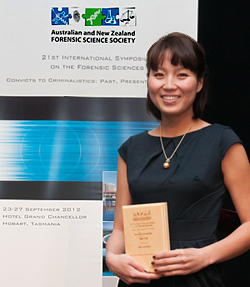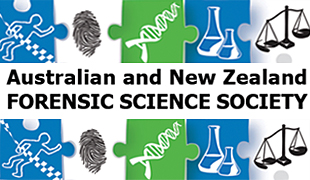MicroRNA research acclaimed at symposium
Thu, 14 Feb 2013 15:08:00 GMT
Mari’s presentation tops the Australian and New Zealand Forensic Science Society International Symposium
 WORLDWIDE interest in a forensic science breakthrough at the University of Huddersfield has received extra stimulus after one its researchers delivered an award-winning presentation at a major conference in Australia.
WORLDWIDE interest in a forensic science breakthrough at the University of Huddersfield has received extra stimulus after one its researchers delivered an award-winning presentation at a major conference in Australia.
Mari L. Uchimoto (pictured), from Montana, USA, is completing her PhD study at Huddersfield. A member of its Forensic Genetics Research Group and supervised by the forensic scientist Dr Graham Williams, she is one of a team working on the use of microRNA analysis in order to identify body fluids obtained – possibly from fingernail scrapings – after crimes such as sexual assault.
A distinctive feature of the Huddersfield-based research is that both DNA and microRNA can be isolated from the same sample, leading to greater efficiency and reduced risk of contamination. And by analysing the RNA molecules, new layers of information can be obtained.
Conventional DNA techniques can state that a person’s body fluid is present in a sample, but cannot state which fluid it is. The method developed at the University of Huddersfield can show that an RNA sample comes from a specific fluid such as blood, saliva, skin or vaginal material. This could be vital evidence for a prosecution or a defence case.
Mari, aged 25, presented a paper describing these techniques to the 21st International Symposium of the Australian and New Zealand Forensic Science Society, which took place in Hobart, Tasmania, attended by hundreds of experts.
 Her paper created a lot of interest – and she had to field critical questions from forensic scientists who favoured other techniques – and the result was that she won the award for Best Oral Presentation in Biological Criminalistics.
Her paper created a lot of interest – and she had to field critical questions from forensic scientists who favoured other techniques – and the result was that she won the award for Best Oral Presentation in Biological Criminalistics.
Mari has since been approached by a number of specialists keen to benefit from the Huddersfield research.
“It can take a long time for a new technique to be established in the forensics world,” said Mari. “But I think ours would be very helpful and there are quite a few companies that are interested in our work.”
Interested in forensics
The daughter of a Japanese-born scientist who is Professor of Astrophysics at the University of Montana, Mari was completing her high school education in Tokyo when she learned about University of Huddersfield and its forensic science courses.
“I’ve always been interested in forensics – even before CSI!” she said.
She enrolled for a degree course at Huddersfield and worked on a project with Dr Williams while completing her undergraduate study. After graduation she moved directly to her PhD, which she aims to complete this year.
Keen to continue with research, she is proud of the University of Huddersfield’s burgeoning global reputation in the field of forensics. See Mari talk more about the research she has been doing in this video.







